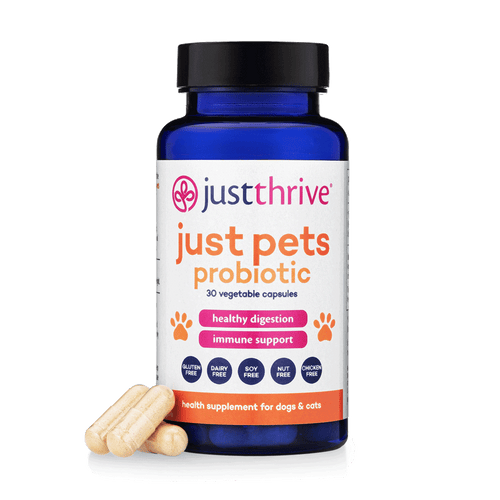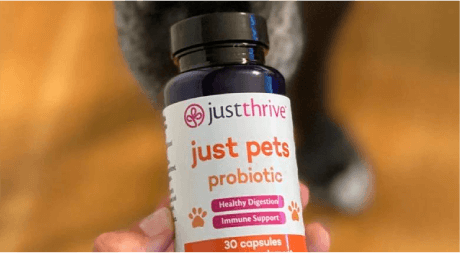How to stay safe and build a resilient microbiome
You know how pets can start to look like their people? Well it turns out you and your pet have another thing in common: your gut microbiomes.
Turns out that pets and their owners can share gut bacteria back and forth. And that’s not always a good thing… especially when antibiotics are involved.
Worse, even drug-resistant bacteria can transfer between you and your pet. And that could put your health at great risk.
That’s why it’s crucial for you both to maintain a healthy gut microbiome all the time. And why you’ll want to rebuild your microbiome resilience any time antibiotics make an appearance.
Drug-Resistant Bacteria Is Not Just a People Problem
We’ve known for a long time that many infectious bacteria can’t be killed by antibiotics. They’ve become resistant to the drugs we use against them. And that means those infections can’t be cured as easily as they used to be. Sometimes not at all. And now drug-resistant bacteria are showing up in our pets too.
One study[1] found that out of 940 infectious bacteria in animals, almost 80% were resistant to one or more antibiotics and 45% were multidrug-resistant (MDR). Many of these bacteria are common in pets, and the number of MDR bacteria found in household pets has been increasing steadily.[2]

Your pet can transmit those bacteria to you and vice versa. So if one of you develops a resistant infection, it can attack both of you.[3]
These resistant bacteria, like MRSA (methicillin-resistant Staphylococcus aureus) and multidrug-resistant E. coli, can lead to critical consequences such as:[4]
- long-lasting infections that require extended treatment, often increasing side effects and long-term health consequences
- longer hospital stays
- unmanageable healthcare costs due to increased treatment needs
- debilitating illness
- death
Antibiotic overuse has caused the rise of these resistant bacteria. And these powerful drugs are still widely prescribed, sometimes saving lives… But almost always causing undesirable side effects.
Antibiotics Kill Off Beneficial Gut Bacteria
The rise of drug-resistant bacteria isn’t the only way antibiotics can cause serious health issues. These drugs are designed to kill bacteria. And that includes the beneficial probiotic bacteria in your gut microbiome that work 24/7 to keep you healthy. The same goes for your pet.
Even one dose of antibiotics can destroy huge populations of probiotic gut bacteria without killing off all the pathogens. Those harmful bacteria take advantage of the situation, taking over space and multiplying out of control to create pathogen blooms. When pathogens outnumber probiotics in your gut microbiome, they create a condition called dysbiosis. And that can cause serious health problems for you or your pet.[5,6]
Another way antibiotics affect the gut microbiome: They significantly reduce bacteria diversity. Healthy guts contain more than 500 types of bacteria. But in a gut plagued with dysbiosis, such as from antibiotic use, that number can get slashed by half or more.[7,8]
Losing such a significant number of beneficial bacteria can lead to a variety of issues, from gastrointestinal issues like diarrhea to mental health issues like depression and anxiety.
Antibiotic Consequences for You and Your Pet
When you fill any prescription for antibiotics, whether it’s for you or your pet, you’ll usually see a full page of potential side effects you’d rather avoid. And while antibiotics may protect you from infectious pathogens, they can also leave you feeling sicker and weaker.
Common antibiotic side effects for both pets and people include:[8,9,10,11]
- Diarrhea
- Nausea
- Vomiting
- Bloating
- Abdominal pain
- Indigestion
- Depression
- Anxiety
- Allergies
Those issues may linger long after the antibiotics are done. Studies show that it can take months or years for the gut microbiome to recover after antibiotics.[12] And that’s a long time to suffer with antibiotic consequences.

What Cross-Species Transfer Means for Your Health
You and your pet share bacteria that affect both of your gut microbiomes.[13,14] And between antibiotic-induced dysbiosis and drug-resistant bacteria, that can potentially lead to big and persistent health problems.
One study declared: “Transmission of antimicrobial resistant bacteria between people and household pets . . . is an emerging global public health problem.”[3]
This means that you could end up with dysbiosis if your pet needs a course of antibiotics. Or that your disrupted gut microbiome could lead to your dog getting diarrhea. It also increases your risk of passing dangerous resistant strains back and forth.
All of this could have implications for your overall health. Your gut microbiome plays key roles in:
- Digestion[15]
- Immunity[16]
- Mental health[17]
- Memory and cognition[18]
- Sleep[19]
- Cardiovascular health[20]
- Longevity[21]
That’s why it’s critical to keep your gut microbiome healthy and full of diverse beneficial probiotic bacteria. And the same goes for your pet.
How to Build a Resilient Gut After Antibiotics
A healthy well-balanced gut microbiome calls for a robust population of beneficial bacteria. Antibiotics can wipe that out in a single dose. But you can support a resilient gut during and after a course of antibiotics… and keep it strong and healthy every day.
The most important step toward that is to replenish those bacteria through probiotic supplements. But even though you and your pet may share some cross-species bacteria, you should not take the same probiotics. Your pet should take a probiotic supplement specifically formulated for animals. And for you, you want a probiotic that can stand up to antibiotics.
Unfortunately, though, most probiotics are highly vulnerable to antibiotics. So they don’t live long enough to take hold in the gut and build up colonies.
That’s where spore probiotics make a difference. Spore probiotics, including Bacillus subtilis and Bacillus clausii, are survivors. They can withstand much more than any other strains, including exposure to antibiotics.[22,23] For example, Bacillus clausii has been shown to withstand the use of multiple antibiotics to support digestive health, even during times when your microbiome is challenged.[24] If anyone in your orbit—including a pet—is taking antibiotics, supplementing with spore probiotics can help keep your gut microbiome healthy.[25]
As for your pet, you’ll want to make sure to give them pet-specific probiotic strains. The best strains for pets include Pediococcus acidilactici, Bacillus subtilis, and Bacillus licheniformis, which are known as universal animal microbiome colonizers.[26,27] These animal-friendly probiotics can help transform your pet’s gut health for the better.
Bottom line: A healthy gut microbiome requires proactive attention with the right probiotics, especially when antibiotics enter the mix.
Keep Your and Your Pet’s Guts Healthy with Just Thrive
A healthy gut microbiome is the key to overall wellness for you and your pet. And it’s even more important to support your gut when it’s facing extra challenges.
Just Thrive Probiotic contains a clinically studied combination of powerful spore probiotics including:
- Bacillus subtilis HU58™
- Bacillus clausii (SC-109)
- Bacillus coagulans (SC-208)
- Bacillus indicus HU36™
Just Thrive Probiotic helps keep your gut well-balanced and supports a vast population of diverse probiotic bacteria.
Just Pets Probiotic contains three strains of probiotics known to support your pet’s gut microbiome.
- Bacillus subtilis HU58™
- Bacillus licheniformis SL-307
- Pediococcus acidilactici
Adding just one capsule to your pet’s food daily can help maintain healthy balance in the gut microbiome and support healthy immune responses.
>> Take proactive care of your family’s gut health with Just Thrive Probiotic and Just Pets Probiotic.
Not sure Just Thrive will work? We can help with that.
EVERY Just Thrive purchase is covered by our Bottom of the Bottle, 100% money back guarantee.
That means you can try Just Thrive Probiotic and Just Pets to see how well they work for you and your pet. And we’re confident you’ll notice positive results.
But if for any reason you don’t feel a difference, you can ask for a full product refund at any time. Even if it’s 3 months or 3 years later. Even if the bottle is empty! You’ll get your money back any time, no matter what.
>> Try Just Thrive Probiotic and Just Pets 100% RISK-FREE today, and save 30% on your first month’s subscription with code SUB30.
Sources
- Scarpellini R, et al. Monitoring the Prevalence of Antimicrobial Resistance in Companion Animals: Results from Clinical Isolates in an Italian University Veterinary Hospital. Transbound Emerg Dis. 2023 Sep 14;2023:6695493.
- Chen Y, Liu Z, Zhang Y, Zhang Z, Lei L, Xia Z. Increasing Prevalence of ESBL-Producing Multidrug Resistance Escherichia coli From Diseased Pets in Beijing, China From 2012 to 2017. Front Microbiol. 2019 Dec 10;10:2852. doi: 10.3389/fmicb.2019.02852. PMID: 31921034; PMCID: PMC6915038.
- Jin M, Osman M, Green BA, Yang Y, Ahuja A, Lu Z, Cazer CL. Evidence for the transmission of antimicrobial resistant bacteria between humans and companion animals: A scoping review. One Health. 2023 Jun 26;17:100593. doi: 10.1016/j.onehlt.2023.100593. PMID: 37448771; PMCID: PMC10336692.
- Bharadwaj A, Rastogi A, Pandey S, Gupta S, Sohal JS. Multidrug-Resistant Bacteria: Their Mechanism of Action and Prophylaxis. Biomed Res Int. 2022 Sep 5;2022:5419874. doi: 10.1155/2022/5419874. PMID: 36105930; PMCID: PMC9467707.
- Kesavelu D, Jog P. Current understanding of antibiotic-associated dysbiosis and approaches for its management. Ther Adv Infect Dis. 2023 Feb 24;10:20499361231154443.
- Deschamps C, Apper E, Brun M, Durif C, Denis S, Humbert D, Blanquet-Diot S. Development of a new antibiotic-induced dysbiosis model of the canine colonic microbiota. Int J Antimicrob Agents. 2024 Apr;63(4):107102. doi: 10.1016/j.ijantimicag.2024.107102. Epub 2024 Feb 5. PMID: 38325721.
- Kriss M, Hazleton KZ, Nusbacher NM, Martin CG, Lozupone CA. Low diversity gut microbiota dysbiosis: drivers, functional implications and recovery. Curr Opin Microbiol. 2018 Aug;44:34-40. doi: 10.1016/j.mib.2018.07.003. Epub 2018 Jul 20. PMID: 30036705; PMCID: PMC6435260.
- Stavroulaki EM, Suchodolski JS, Xenoulis PG. Effects of antimicrobials on the gastrointestinal microbiota of dogs and cats. Vet J. 2023 Jan;291:105929. doi: 10.1016/j.tvjl.2022.105929. Epub 2022 Nov 24. PMID: 36427604.
- Mohsen S, Dickinson JA, Somayaji R. Update on the adverse effects of antimicrobial therapies in community practice. Can Fam Physician. 2020 Sep;66(9):651-659.
- Dinan K, Dinan T. Antibiotics and mental health: The good, the bad and the ugly. J Intern Med. 2022 Dec;292(6):858-869. doi: 10.1111/joim.13543. Epub 2022 Jul 12. PMID: 35819136; PMCID: PMC9796968.
- Kiełbik P, Witkowska-Piłaszewicz O. The Relationship between Canine Behavioral Disorders and Gut Microbiome and Future Therapeutic Perspectives. Animals (Basel). 2024 Jul 12;14(14):2048.
- Lekang K, Shekhar S, Berild D, Petersen FC, Winther-Larsen HC. Effects of different amoxicillin treatment durations on microbiome diversity and composition in the gut. PLoS One. 2022 Oct 27;17(10):e0275737.
- Kates AE, et al. Household Pet Ownership and the Microbial Diversity of the Human Gut Microbiota. Front Cell Infect Microbiol. 2020 Feb 28;10:73.
- Abdolghanizadeh S, et al. Microbiota insights into pet ownership and human health. Res Vet Sci. 2024 May;171:105220.
- Bull MJ, Plummer NT. Part 1: The Human Gut Microbiome in Health and Disease. Integr Med (Encinitas). 2014 Dec;13(6):17-22. PMID: 26770121; PMCID: PMC4566439.
- Wiertsema SP, van Bergenhenegouwen J, Garssen J, Knippels LMJ. The Interplay between the Gut Microbiome and the Immune System in the Context of Infectious Diseases throughout Life and the Role of Nutrition in Optimizing Treatment Strategies. Nutrients. 2021 Mar 9;13(3):886.
- Xiong RG, Li J, Cheng J, Zhou DD, Wu SX, Huang SY, Saimaiti A, Yang ZJ, Gan RY, Li HB. The Role of Gut Microbiota in Anxiety, Depression, and Other Mental Disorders as Well as the Protective Effects of Dietary Components. Nutrients. 2023 Jul 23;15(14):3258.
- Tooley KL. Effects of the Human Gut Microbiota on Cognitive Performance, Brain Structure and Function: A Narrative Review. Nutrients. 2020 Sep 30;12(10):3009. doi: 10.3390/nu12103009. PMID: 33007941; PMCID: PMC7601389.
- Sejbuk M, Siebieszuk A, Witkowska AM. The Role of Gut Microbiome in Sleep Quality and Health: Dietary Strategies for Microbiota Support. Nutrients. 2024 Jul 13;16(14):2259. doi: 10.3390/nu16142259. PMID: 39064702; PMCID: PMC11279861.
- Nesci A, Carnuccio C, Ruggieri V, D'Alessandro A, Di Giorgio A, Santoro L, Gasbarrini A, Santoliquido A, Ponziani FR. Gut Microbiota and Cardiovascular Disease: Evidence on the Metabolic and Inflammatory Background of a Complex Relationship. Int J Mol Sci. 2023 May 22;24(10):9087.
- Biagi E, Franceschi C, Rampelli S, Severgnini M, Ostan R, Turroni S, Consolandi C, Quercia S, Scurti M, Monti D, Capri M, Brigidi P, Candela M. Gut Microbiota and Extreme Longevity. Curr Biol. 2016 Jun 6;26(11):1480-5.
- Piktel E, Pogoda K, Roman M, et al. Sporicidal activity of ceragenin CSA-13 against Bacillus subtilis. Sci Rep. 2017;7:44452. Published 2017 Mar 15. doi:10.1038/srep44452
- American Society for Microbiology. Antibiotic resistance in spore-forming probiotic bacteria. Published June 21, 2019. Accessed October 14, 2025. https://asm.org/press-releases/2019/june/antibiotic-resistance-in-spore-forming-probiotic-b
- De Castro JA, Kesavelu D, Lahiri KR, et al. Recommendations for the adjuvant use of the poly-antibiotic-resistant probiotic Bacillus clausii (O/C, SIN, N/R, T) in acute, chronic, and antibiotic-associated diarrhea in children: consensus from Asian experts. Trop Dis Travel Med Vaccines. 2020;6:21. Published 2020 Oct 23. doi:10.1186/s40794-020-00120-4
- Goodman C, Keating G, Georgousopoulou E, Hespe C, Levett K. Probiotics for the prevention of antibiotic-associated diarrhoea: a systematic review and meta-analysis. BMJ Open. 2021 Aug 12;11(8):e043054.
- Melara EG, Avellaneda MC, Valdivié M, García-Hernández Y, Aroche R, Martínez Y. Probiotics: Symbiotic Relationship with the Animal Host. Animals (Basel). 2022 Mar 12;12(6):719.
- Anee IJ, Alam S, Begum RA, et al. The role of probiotics on animal health and nutrition. J Basic Appl Zool. 2021;82:52. doi:10.1186/s41936-021-00250-x












